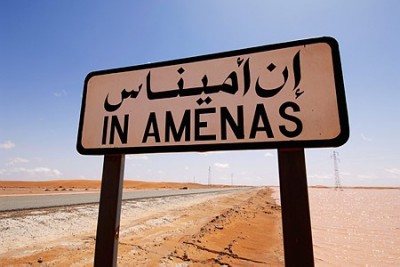One year after Norwegian oil company Statoil was hit by a terrorist attack at a gas plant it co-operated in Algeria, the company continues to do business in a string of dangerous places. Like other oil companies around the world, Statoil has been expanding into politically unstable areas of the Middle East and North Africa, because that’s where the oil and gas resources are.

Statoil employees gathered on Thursday to mark the one-year anniversary of the attack on the In Amenas plant in the southern desert of Algeria. It was stormed on January 16 last year by armed terrorists who took hundreds of employees hostage. Uncertainty reigned for days, and by the time it was all over, 40 employees were dead including five of the 17 Statoil workers at the plant.
Another 29 of the terrorists were killed and three arrested, all of whom belonged to an Islamist group believed to be seeking revenge for the French military’s operations in neighbouring Mali. Others disputed the motives for the attacks, claiming it was planned long before the Mali operations began.
The attack on the In Amenas plant, which Statoil ran along with British Petroleum (BP) and Sonatrach of Algeria, was the worst in Statoil’s history or that of any Norwegian company. Although Statoil officials have trained staff in the event of terrorist attacks, it nonetheless stunned both the company and the country as well, and brought the ongoing threat of terrorism much closer to home.
Twelve months on, Statoil still doesn’t consider the In Amenas plant safe enough for its Norwegian personnel but the company, under the management of CEO Helge Lund, has continued to expand its presence worldwide and, not least, in potentially dangerous places run by authoritarian regimes or where state government structures are unstable.
“Security in the whole region (the Middle East and North Africa) has become considerably worse,” researcher Henrik Thune of the Noregian foreign policy institute NUPI told Norwegian Broadcasting (NRK). “The main reason is the negative directions taken after the Arab Spring. The states have been weakend. They no longer can guarantee security like they thought they could earlier.”
Statoil still continues to operate, though, in Libya, Nigeria, Algeria and Angola, with the situation in Libya viewed as the most risky. Statoil withdrew its workers there in December for fear they’d be kidnapped. The country has also been subject to new suicide bombings and expats aren’t returning.
Norway’s own foreign ministry has issued travel warnings in many of the countries where Statoil has plants, offices and crews, because diplomats think the risks for foreigners are too high. That includes Nigeria, Mozambique, Algeria, Azerbaijan and Libya.
Statoil ‘takes safety seriously’
Statoil executives claim they take their responsibility to ensure employees’ safety seriously, telling newspaper Aftenposten on Thursday that the company’s presence abroad hinges on whether it can “carry out our obligations and operations in line with national laws, international standards and our own ethical guildelines.” Asked whether Statoil should operate in undemocratic and corrupt countries or whether it can hinder its local tax payments from landing in the hands of the elite, Statoil spokesman Knut Rostad stated that “it’s not our job to comment how a country distributes its own tax income.”
Others have questioned Statoil’s risk analysis, but Rostad claimed Statoil “carries out its own risk evaluations before we go into a country and while we are there.” He wouldn’t identify any countries where Statoil has ruled out operations. He called the attack at In Amenas one that was “without parallel in our industry,” and said it had changed the way Statoil and the industry works and views security.
Memorial in Stavanger
On Thursday Statoil employees and their families were gathering at the cathedral in Stavanger, where Statoil is based, for a memorial to the five Norwegians — Tore Bech, Thomas Snekkevik, Hans M Bjone, Alf Vik and Victor Sneberg — killed in the attack a year ago.
“Forty innocent people were killed, Statoil lost five good and highly respected colleagues with long seniority in the company,” Statoil Chairman Svein Rennemo told those assembled. “Our unity was strong last January and it has been strong since. That’s our strength. Today, it’s a unified Statoil that is showing its support for all those affected.
“We are here to show respect for those who didn’t come home. I want to express our strong and warm sympathy for all the families who lost their loved ones, with those who came home after gruesome experiences and with friends and colleagues who have experienced great sorrow.”
newsinenglish.no/Nina Berglund

